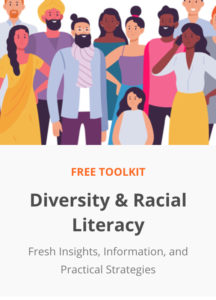What’s the first thing that comes to mind when you hear the word “expat”? Is it maybe a white American or European living abroad, probably for a handful of years and with plenty of leisure? And what about an “immigrant”? Do you get an image of someone striving for a better life, trying to escape some form of hardship? But ultimately, what is the actual difference between these words? They both refer to individuals who have moved away from their home countries, yet they call to mind very different types of people. What’s happening with these words, and with several other binaries, is that they are associated with a societal discourse that depends on the way we categorize people from certain groups, and as educators, it is imperative we break these cycles to better guide and support our students. No words are truly “neutral,” no matter how hard we would prefer this to be true.
Let’s look at a few other examples.
“Developing” Nations
 When you think of a “developing” country, you probably think of nations that lack infrastructure in some fashion, that suffer from pestilence and corruption and violence. Yet by definition, these countries are being compared, negatively, with those that are seen as “developed” according to the same metrics. “What’s wrong with this?” you might ask. Well, how did these countries wind up in this situation? Is it possible that the so-called developed countries had a hand in exploiting the people and the resources of these other nations? When we assign value to people or places without considering the causes, we blame oppressed groups for misfortune that was deliberately caused by the choices of more powerful people, and much of our language reflects our desire to ignore our societal culpability in this hierarchy.
When you think of a “developing” country, you probably think of nations that lack infrastructure in some fashion, that suffer from pestilence and corruption and violence. Yet by definition, these countries are being compared, negatively, with those that are seen as “developed” according to the same metrics. “What’s wrong with this?” you might ask. Well, how did these countries wind up in this situation? Is it possible that the so-called developed countries had a hand in exploiting the people and the resources of these other nations? When we assign value to people or places without considering the causes, we blame oppressed groups for misfortune that was deliberately caused by the choices of more powerful people, and much of our language reflects our desire to ignore our societal culpability in this hierarchy.
“Low-Skill” Jobs
We can do this all day, of course. What does it mean for a job to be considered “low-skill”? Would you classify a custodian that way, or a delivery person? The only thing we truly mean by “low-skill” is “undervalued,” yet by labeling these people and professions accordingly, we indicate that they deserve their lack of status and compensation. “Soft” skills are now seen as useful, but by being placed in opposition to “hard” or “technical” skills, those with “soft” skills can be paid less than their counterparts. And of course, our image of “good” schools ignores the fact that said institutions are better funded and rarely neglected.
As educators, we must consider if one group is always associated with a negative descriptor before using it. We have to avoid using value judgments in describing binaries that are more about exploitation and power than reality. It is imperative that we examine our teaching materials and curricula for phrases such as these and any others you can identify that are erroneously positioned as “neutral.” This is not to say we can’t use these words—on the contrary, they make for fruitful lesson plan fodder!
We can’t be afraid to honestly discuss the process and reality of minoritization (i.e., power being taken from certain groups). We will be better teachers and leaders if we find a way to confront the potential harm in the language we use than if we continue to ignore the impact of our words. There are many groups and organizations that exist specifically to support teachers in addressing the complexities of oppression; you are encouraged to seek them out and learn from them as you uncover the codes in the language you’re already using.
For more on coded language from JPB Gerald, check out our webinar “A Discussion of Harmful Coded Language: Decoding Whiteness and Anti-Blackness in Education“
See also:
- Cultural Humility in Academic Librarianship: Interview with DEI Librarian Twanna Hodge
- Unpacking Diversity Resources: An Interview about Diversity Audits and Best Practices
- Integrating Racial Literacy in Your Library Program: Resources for Consideration
- Tough Conversations with Students: Racism and Mental Health
- Webinar: #thisisamerica: Session 1: How COVID-19 Placed a Spotlight on the Inequalities in America’s School System



